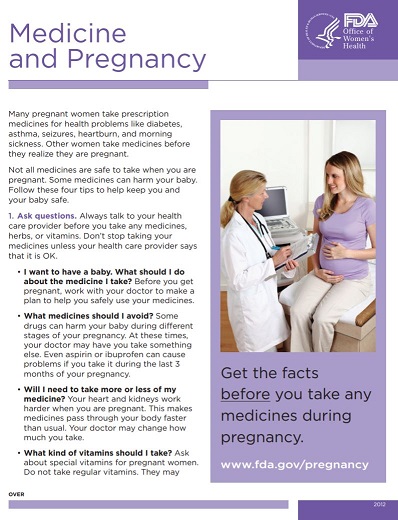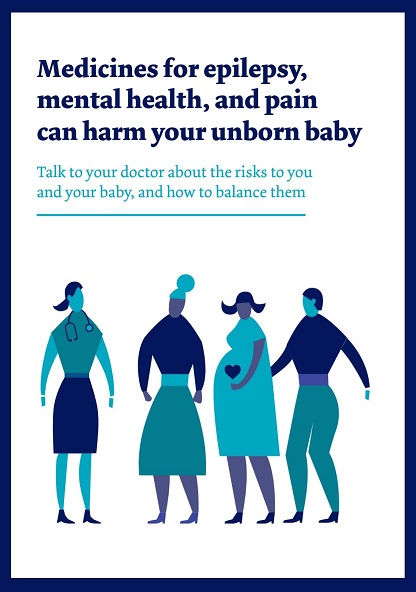You can now add Healthify as a preferred source on Google. Click here to see us when you search Google.
Medicines and pregnancy overview
Key points about medicines and pregnancy
- If you are planning a pregnancy or find you are pregnant, don't stop taking your medicines until your doctor or midwife says that it is okay.
- Always talk to your doctor, midwife, or pharmacist before you take any medicines, herbs, or homeopathic remedies.
- Make sure your GP, dentist, pharmacist or other healthcare professional knows you’re pregnant before they prescribe anything or give you treatment. It’s always best to check before you take any kind of medicine.
- Women who are pregnant or planning a pregnancy are often faced with the dilemma about using medicines during pregnancy.
- Before starting or stopping any medicine, check with your pharmacist, midwife or GP that it's suitable.

Almost every pregnant woman will face a decision about taking medicines before and during pregnancy. Some women may be taking medicines to manage a health condition before they become pregnant (such as diabetes, asthma, epilepsy or depression), while other women may develop a health condition during pregnancy that requires treatment with medicines (such a urinary tract infection).
Here are examples of questions to ask your healthcare provider:
- Will I need to change my medicines if I want to get pregnant?
Before you get pregnant, work with your healthcare provider to make a plan to help you safely use your medicines. - How might my medicine affect my baby?
Ask about the benefits and risks for you and your baby. - What medicines, supplements and herbs should I avoid?
Some medicines, supplements and herbs can harm your baby during different stages of your pregnancy. At these times, your healthcare provider may recommend you take something else or stop taking it while you are pregnant. - Will I need to take more or less of my medicine?
Your heart and kidneys work harder when you are pregnant. This makes some medicines pass through your body faster than usual, so doses may need to change. - Can I keep taking my medicine when I start breastfeeding?
Some medicines are safe, but some can get into your breast milk and affect your baby. - What kind of vitamins should I take?
Ask about special vitamins for pregnant women called pre-natal vitamins. Some dietary supplements may have too much or too little of the vitamins that you need. Talk to your healthcare provider about what kind of pre-natal vitamins you should take before you start taking them.
Many medicines can be taken safely when you are pregnant but it is important to check with your doctor, midwife or pharmacist first. Some medicines may cause harm but not treating some conditions during pregnancy can be just as risky or more risky to you and your baby.
The decision about whether to use medicines during pregnancy depends on your individual circumstances. Your doctor or midwife will look at whether the risk of taking medicine is higher than the risk of not treating your illness, and if you or your baby would face worse problems without treatment.
The effects of your medicine on you and your baby may depend on many factors, such as:
- the safety categories of medicines
- how much medicine you take (the dose)
- the stage of pregnancy you take the medicine
- other health conditions you have
- other medicines you take.
Many women think that herbal and homeopathic remedies and aromatherapy (sometimes called natural medicines) are safe, but this is not necessarily the case. Not all "natural" remedies are safe in pregnancy. Examples of supplements that should be avoided in pregnancy, include vitamin A, vitamin D, black cohosh, dong quai, butterbur, cat’s claw, fenugreek, flaxseed and flaxseed oil, goldenseal and liquorice root. Also, since there is lack of regulation of the quality or contents of herbal and homeopathic products, they may be contaminated with heavy metals, toxic plants, bacteria and pharmaceutical impurities.
Tell your doctor, midwife or pharmacist if you're using herbal, homeopathic or aromatherapy remedies. If you do decide to use these therapies, you should always check with your doctor, midwife or pharmacist. You should tell your practitioner that you're pregnant before discussing any treatment.
Not all pregnancies are planned. Some women will already be taking medicines when they find out they’re pregnant. If you took medicines before you learned you were pregnant, talk with your GP or midwife about any changes you may need to make. Don't stop taking any prescribed medication. Talk to your doctor first.
It can be hard to know if a medicine is safe for your baby. Most medicines are not well studied in pregnant women, because researchers worry about how the medicines might affect the baby. But some medicines have been taken for so long by so many women that doctors have a good idea of how safe they are. Talk to your doctor or midwife before you take any medicines.
What are the safety categories of medicines during pregnancy?
When your doctor or midwife discusses your options about medicine use in pregnancy, they may look up the safety category for medicines in pregnancy. There is a safety category system for prescribing medicines in pregnancy which have been developed by medical and scientific experts based on levels of risk. This information is to help make decisions when prescribing medicines to pregnant women and takes into account the known effects of medicines on the baby, including birth defects, effects around the time of birth, and problems that may occur in later life.
Categorisation systems are only a guide and should not be the sole basis of decision making.
Can I use information I find online?
Take care when looking at online sources about medicine safety in pregnancy. You can use this information to start a conversation with your healthcare professional. Many websites post lists of medicines that are “safe” to take during pregnancy. However, for many medicines, there is not enough scientific evidence to be sure of their safety during pregnancy.
You also need to consider how these might interact with other medicines or supplements you are taking, which is why it is advised to talk to your healthcare professional to get the complete picture.
The following links have more information on medicines and pregnancy.
Medicines in pregnancy(external link) NHS Choices
Understanding how risk is discussed in healthcare(external link) RCOG, UK
Resources
Medicines for epilepsy, mental health and pain can harm your unborn baby(external link)(external link) ACC, NZ, 2020
Medicine and pregnancy(external link) Office of Women's Health, US
5 questions to ask about your medications(external link) Health Quality and Safety Commission, NZ, 2019 English(external link), te reo Māori(external link)
References
- Community pharmacy guide on medicine safety in pregnancy(external link) BPAC, 2019
- Medicine and pregnancy(external link) U.S Food and Drug Adminsitration (FDA)
- Prescribing medicines in pregnancy database(external link) Therapeutic Goods Administration, Australia
- BUMPS (Best use of medicines in pregnancy)(external link) UK Teratology Information Service
Brochures

Office of Women's Health, US

Medicines and side effects
Healthify He Puna Waiora, NZ, 2024
Credits: Sandra Ponen, Pharmacist, Healthify He Puna Waiora. Healthify is brought to you by Health Navigator Charitable Trust.
Reviewed by: Angela Lambie, Pharmacist, Auckland
Last reviewed:
Page last updated:






